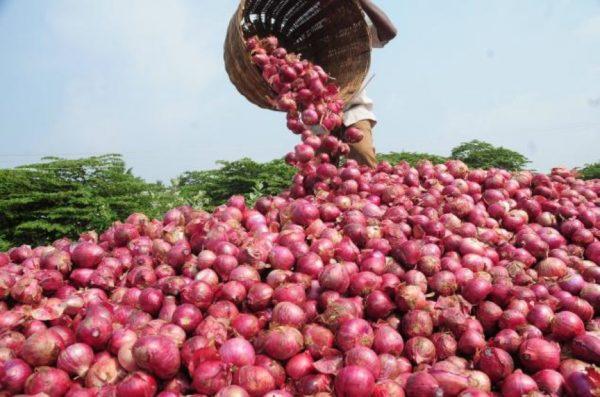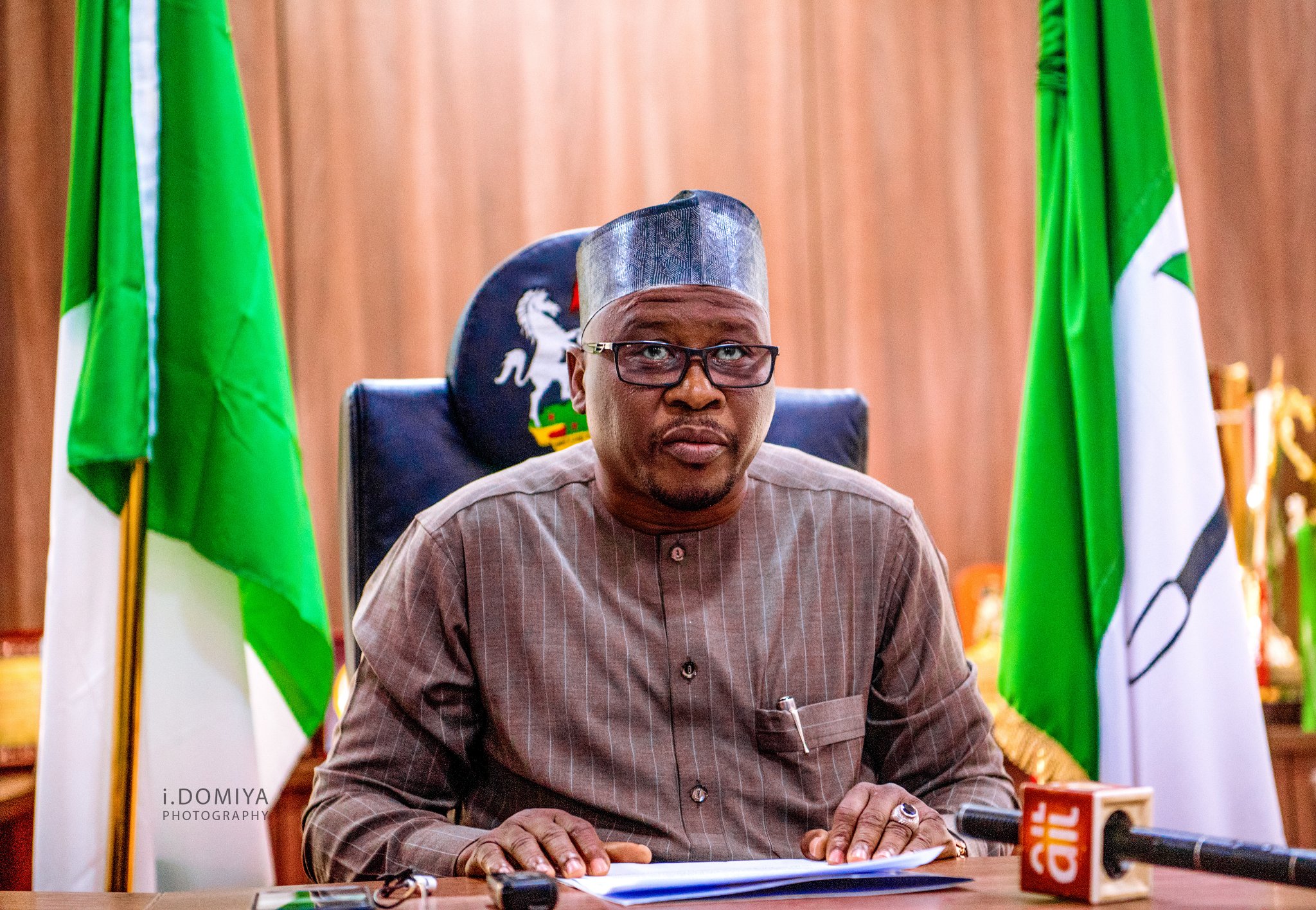Agriculture
FG yet to meet national demand of 2.44m metric tonnes onion

Nigeria is yet to meet its national demand of 2.44 million metric tonnes of onion production and currently contributes little to the export market.
The Permanent Secretary of the Ministry of Agriculture and Rural Development, Dr Ernest Afolabi-Umakhihe, represented by a Director in the ministry, Mrs Omotosho Marvelous, made this known in Birnin Kebbi on Friday at a workshop on the adoption of good post-harvest handling and Improved storage techniques for Onion production in Nigeria.
”Nigeria is among the major producers of onions in the world, recently ranked 2nd in Africa and 7th in the world.
“In spite of this potential, Nigeria is yet to meet her national demand 2.44 million metric tonnes and currently contributes little to the export market.
“This is largely due to inadequate knowledge and skills in onion production resulting in high post-harvest losses, poor yield and produce less quality, among others,” she said.
“Over 40 per cent of onions were lost at post-harvest and storage levels.
“Though there is a slight increase in the national output from 1.4 million metric tonnes in 2018 to 1.52 million metric tonnes in 2020, about 622,084 metric tonnes were recorded as post-harvest losses with only 895,195 metric tonnes being utilised.
”The demand gap is 1.54 million metric tonnes amidst explosive population growth to be bridged by the importation of onions and onion products such as onion powder, and oil, among others, valued at 3.22 million dollars in 2020 which exerts enormous pressure on our foreign exchange earnings,” she said.
Afolabi-Umakhihe said the training is aimed at continuing to upgrade the knowledge and technical know-how of elite farmers, and relevant desk officers, among others, to reduce post-harvest losses and increase onion shelf-life.
“The training of elite farmers, relevant desk officers and detention staff, subject matter specialists on coordinated agricultural innovation approach required, will enable you to guide other farmers in best storage protocol to achieve sustainable agricultural production for food sufficiency and global export market,” she said.
Afolabi-Umakhihe urged the trainees to take advantage of the opportunity in order to acquire the needed knowledge and skills for onward cascading to other farmers in the state.
Earlier, a Director Federal Ministry of Agriculture, Alhaji Shehu Abdullahi, said that the priority of the present administration was the state of a nation’s agricultural development at any time that could be assessed as a result of the use of unlimited improved agricultural technologies to satisfy its goals and objectives.
He called on the trainees to take advantage of their presence and interact with them to build their capacity and knowledge base.
Abdullahi commended the efforts of the horticulture value chain for organising the event adding that it would have a positive impact in order to reduce post-harvest losses and increase farmers’ returns on investment.
“It is my sincere hope that this training workshop will be given the seriousness and diligence it deserves. You are, therefore, encouraged to disseminate every knowledge gathered here to other colleagues who were not privileged to attend,” he urged.
Speaking on behalf of the participants, the Secretary of the National Onion Producers, Processors and Marketers Association of Nigeria (NOPPMAN), Shuaibu Isah, thanked the ministry and the federal government for organising the training for them and assured them that they would utilize what they were thought for the purpose it was meant to achieve.
Agriculture
Fintiri Unleashes N2bn Boost for Farmers as Adamawa Rolls Out 2025 Agricultural Support Programme

The Adamawa State Government has launched the 2025 Agricultural Support Programme aimed at empowering smallholder farmers and enhancing food security across the state.
Commissioner for Agriculture, Prof. David Jatau, disclosed this on Friday while briefing journalists in Yola. He revealed that Governor Ahmadu Umaru Fintiri had approved a substantial N2 billion for the initiative, which targets increased agricultural productivity in the upcoming farming season.
According to Jatau, the programme—which is already underway—will provide subsidised agricultural inputs such as fertilisers, improved seeds, and other essential materials to farmers in six local government areas.
“The programme has already commenced in six LGAs—Madagali, Michika, Hong, Maiha, Demsa, and Ganye,” he said. “By next year, during the rainy season, we will extend the programme to the remaining LGAs.”
He explained that 300 hectares of farmland would be cultivated in each of the participating local governments, with 300 farmers benefitting per council.
To ensure fairness and transparency, Jatau said a multi-stakeholder committee had been constituted to oversee the beneficiary selection process. The committee comprises representatives of traditional councils, local government authorities, security agencies, youth groups, and women organisations.
“We are also equipping extension workers with training to offer farmers guidance on modern agricultural techniques for improved yield,” he added.
The commissioner noted that the intervention would not only increase food production but also generate employment, improve rural incomes, and contribute to economic stability in farming communities.
Jatau also revealed that the state government is collaborating with non-governmental organisations and agricultural development bodies, with over 2,700 hectares of farmland pledged by development partners for cultivation.
He reaffirmed the Fintiri administration’s commitment to achieving food self-sufficiency and urged beneficiaries to make the most of the programme.
Agriculture
KWASU Microfinance Bank disburses loan to farmers

The Kwara State University (KWASU) Microfinance Bank has provided loan facilities to farmer groups in and around Malete, Moro Local Government Area.
The Vice-Chancellor and Chairman of the Board of Trustees, KWASU Microfinance Bank, Prof. Jimoh Shaykh-Luqman, announced this while presenting offer letters to the farmers’ associations at a formal event held on the university campus.
Addressing the farmers, the Vice-Chancellor, represented by the Deputy Vice-Chancellor (Administration), Prof. Moshood Jimba, said the agricultural loan scheme aimed to support farmers in boosting food production and enhancing food sustainability.
“The loan is meant to support your farm operations, especially in the upcoming planting season,” he said.
Prof. Shaykh-Luqman reaffirmed KWASU’s commitment to its mantra of being a “University for Community Development,” leveraging its expertise and resources to initiate programmes that drive local development.
The Managing Director and Chief Executive Officer of KWASU Microfinance Bank, Alhaji Hakeem Hassan, noted that the agricultural loan scheme was piloted last year with 15 farmers as beneficiaries.
He added that the pilot scheme yielded positive results for both the farmers and the bank, as all beneficiaries successfully repaid their loans.
Following this success, he said, the scheme had been expanded to include more farmers under various farmers’ associations.
The News Agency of Nigeria (NAN) reports that the associations benefiting from the agricultural loan scheme include Alanu Agbelere Farmers Group, Agbedola Ketere Group, and Itesiwaju Agbe Group Omoni.
Others are Agbeloba Farmers Association (Malete Market), Agbeyewa Elemere Farmers Group, Agbe Olofeere Group, and Agbeloga Malete Farmers Group.
Speaking on behalf of the farmers, the Chairman of Agbeloba Farmers Association (Malete Market), Alhaji Mohammed Abdulrazaq, expressed gratitude to the university and the bank for their trust.
He pledged, on behalf of the beneficiaries, to utilise the loans effectively and ensure prompt repayment.
Agriculture
Kano Govt. implements N2.3bn livestock empowerment programme

The Kano State Government has begun implementing the second phase of its livestock empowerment programme valued at N2.3bn under the Kano State Agro-Pastoral Development Project (KSADP).
The Commissioner for Agriculture and Natural Resources, Dr Mamood Danjuma, disclosed this while addressing newsmen on Thursday in Kano.
Danjuma said the initiative aims to support beneficiaries with livestock, feeds, drugs, and salt lick to enhance their economic well-being.
According to him, 911 beneficiaries are being supported with two rams each, feed for three months, drugs and salt lick, while 2,386 women are being supported with two goats and a buck goat in the poorest households in the state.
He explained that the total package under the empowerment programme showed that 1,342 bulls were procured by the government at the cost of N560m, 1,822 rams were procured at the cost of N175m and 7,158 goats bought at the cost of N451m.
“Under the cattle scheme, each cattle gains 100kg over a period of 120 days. The fattening period is for 120 days, making three cycles possible in a year.
“As for the small ruminants fattening scheme, with the same 120-day fattening period yielding an extra 15kg/animal.
“The project promotes goats’ reproduction through women who will take care of the animals and sell the young ones to improve their income and standard of living,” he said.
He said that the programme promotes economic empowerment, particularly among women, by providing them with livestock to care for and sell, ultimately improving their income and standard of living.
-

 Headlines4 years ago
Headlines4 years agoFacebook, Instagram Temporarily Allow Posts on Ukraine War Calling for Violence Against Invading Russians or Putin’s Death
-

 Headlines4 years ago
Headlines4 years agoNigeria, Other West African Countries Facing Worst Food Crisis in 10 Years, Aid Groups Say
-

 Foreign4 years ago
Foreign4 years agoNew York Consulate installs machines for 10-year passport
-

 News1 year ago
News1 year agoZero Trust Architecture in a Remote World: Securing the New Normal
-

 Entertainment3 years ago
Entertainment3 years agoPhyna emerges winner of Big Brother Naija Season 7
-

 Headlines2 years ago
Headlines2 years agoNigeria Customs modernisation project to check extortion of traders
-

 Entertainment2 years ago
Entertainment2 years agoMovie download platform, Netnaija, announces closure
-

 Economy2 years ago
Economy2 years agoWe generated N30.2 bn revenue in three months – Kano NCS Comptroller













